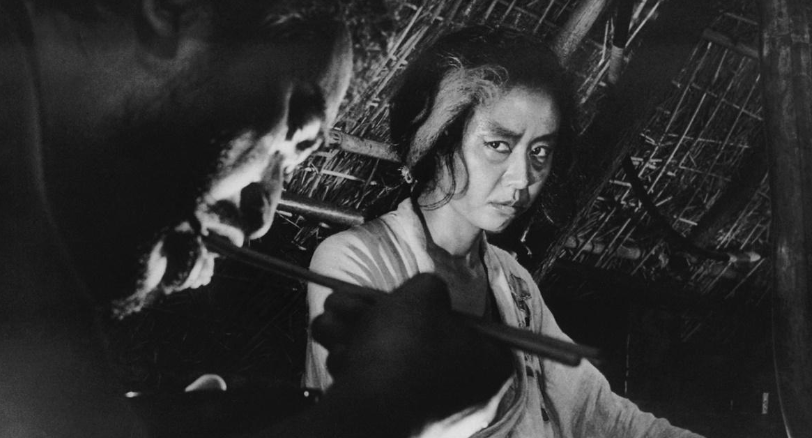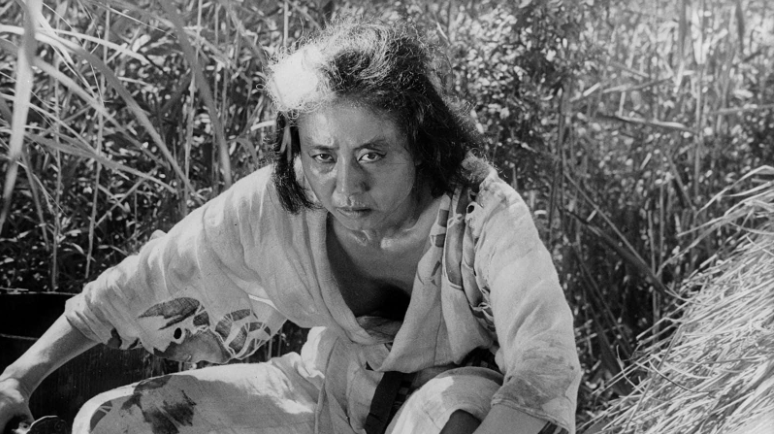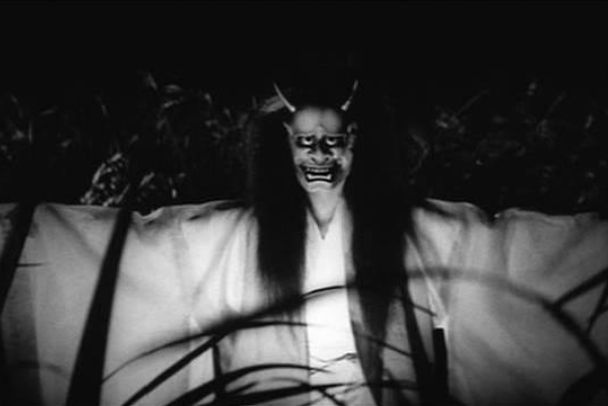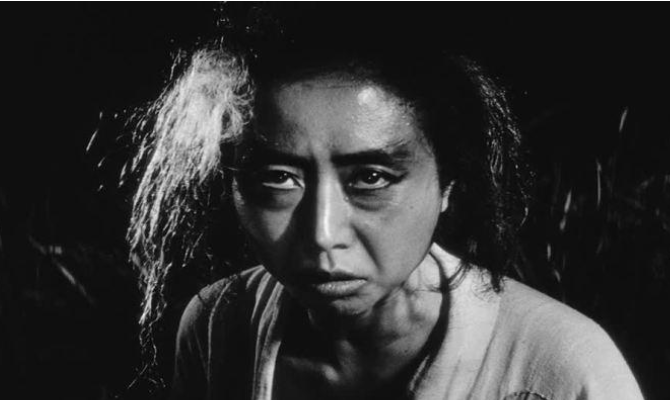[Mother of Fears] A Certain Hunger in Onibaba (1964)
Welcome to Mother of Fears – a monthly column that will explore the various roles that mothers play within the horror genre. Mothers are a staple feature in horror movies, and yet, their stories, motivations, representations, and relationships with their children are so varied and complex that we never feel like we’re watching the same story twice. Every month I will take a look at a different mother from the world of horror, explore their story, and look at how they fit into the broader representation of women in horror.

Set during the mid-fifteenth century, Onibaba (1964) tells the story of two women fighting for survival. Credited only as Older Woman and Younger Woman (or Kichi's Mother and Kichi's Wife) according to IMDB, the story is focussed on the lengths these women will go to survive a war, and yet they’re not even given names, unlike the male characters. The men are active participants in this war, but it’s the women who are left behind and forgotten about that we follow.
We first meet the two women when they attack and kill two soldiers as they try to flee through the field of grass. It’s all over in a few moments for the men, and it’s clear that the women have been working together as a team in this way for some time. The strategically timed double stab and the quick but thorough way these women strip the soldiers of their armour and weapons speaks to practice and efficiency. Not a word is spoken between the two as they complete their work, dump the bodies in the nearby pit, and take the items to be sold.
The older woman is the mother of Kichi, a young man who has been drafted into the ongoing war. Along with the younger woman, her daughter-in-law, she has been forced into this extreme method of survival due to the absence of her son and a failed crop.
LISTEN TO OUR HORROR PODCAST!
![[Ghouls Podcast] Ghouls Watch: Bucket List of the Dead, Blood Drive, Candy Land & more](https://images.squarespace-cdn.com/content/v1/5fe76a518d20536a3fbd7246/1696261000263-58VQFOVWPE363OFGP7RF/GHOULS+WATCH.jpg)
For all their hard work the women are rewarded with two bags of grain from a merchant named Ushi who resells the armour and weapons back to the desperate armies still involved in the fight. Ushi refuses a bag of third grain for the items but offers to exchange another bag if the older woman will sleep with him, which she refuses.
As the women dine on the meagre meal that night, their neighbour Hachi returns from the war asking for food and eating three helpings before revealing to the women that he and Kichi were attacked just a few days ago. After trying to steal food from nearby houses, their group was attacked by farmers and Kichi was beaten to death. The older woman now has to deal with the fact that not only did Hachi return without her son, but Kichi didn’t even die in combat. He died in a very similar way to all the soldiers she and her daughter-in-law have dispatched. Much like the family he left behind, it was hunger that drove Kichi to the edge, but he was unlucky enough to come out on the losing side.
🧟♀️HELP US STAY UNDEAD🧟
We are a small & independent online magazine.
If you enjoy our content please consider donating or becoming a member.
Ghouls Gang members also get access to bonus podcasts, articles and much more.
Your contribution really makes the difference and helps us stay undead!
💜Thank You💜
The older woman immediately takes a disliking to Hachi and warns her daughter-in-law to stay away from him. Not only does she judge him for making it home himself and not helping to protect her son, but his presence is a constant reminder of the way her son died. The older woman also recognises that with Kichi dead, her daughter-in-law is technically single, and Hachi is the only eligible bachelor left in the area with all the other men still off fighting the war.

And while some of this concern about what her daughter-in-law is up to may be out of respect for the memory of her dead son, the real reason the older woman is so worried about the younger woman leaving is that she knows she cannot survive without her. Killing soldiers and selling their belongings is a two-person job, and the older woman relies on her daughter-in-law to do a lot of the chores in their hut. If she is left alone without even the promise of her son returning one day, the older woman is likely to die if she can’t grow anything on the surrounding land due to poor weather.
One day while the three neighbours are chatting, two fighting soldiers end up in the nearby water and are quickly killed by Hachi and the two women. Hachi sells the armour to Ushi and is gifted three bags of grain, one of which he swaps for a bottle of saké. He also grabs some dead birds hanging nearby as part of his reward and returns to the older woman’s hut to share the meal. While the women get the benefit of these rewards, Hachi is treated very differently by Ushi for handing over the same amount of armour and weapons as the women did in their last encounter. Ushi clearly perceives him as a better business partner, perhaps because he thinks Hachi has more knowledge as an ex-soldier or merely because he is a man.
Of course, Hachi and the young woman are drawn to each other. Both of them have been separated from the opposite sex for quite some time due to the war, and the younger woman now knows she will never get her husband back. She begins to sneak out into the night, running through the pitch-back tall grass to reach Hachi’s dilapidated hut and have sex.

However, it doesn’t take long for the older woman to notice her daughter-in-law sneaking out. One night she follows her and catches the younger woman having sex with Hachi. The older woman flees the scene in a rage which soon turns into an expression of sexual frustration as she grinds herself against a tree. We have no idea what has happened to the older woman’s husband, but it’s clear that she’s jealous of the younger woman’s new relationship.
She wants someone to lust after her and doesn’t just want to have to trade sexual favours to get another bag of grain to eat. The older woman even goes as far as to visit Hachi the next morning and offer him the chance to sleep with her, but he turns her down in favour of the younger woman. The older woman realises that if her daughter-in-law and Hachi strike up a full-blown relationship she will be excluded and left with nothing. No one else seems to want the memory of Kichi hanging over them, but the older woman has no choice as she grieves for her only son.
LISTEN TO OUR HORROR PODCAST!
One night after the young woman has left to visit Hachi, a lost samurai wearing a Hannya mask stumbles across the older woman’s hut and asks her to help guide him out of the grass. He claims he wears the masks because he has the most beautiful face and he was worried about damaging it in the war. The samurai thinks himself better than the older woman, but he knows he has to rely on her knowledge of the field to make his escape. Thinking there is no way she could outrun him, he doesn’t notice her jump over the pit in the field and he plunges to his death.
The older woman descends into the pit to reclaim the armour and weapon the samurai had with him, and after prying the mask off him she finds his face disfigured underneath. As all this took place while her daughter-in-law was out, the older woman decides to use the mask for her own agenda. After chatting to her daughter-in-law and mentioning that sex outside of wedlock is sinful, she hatches a plan for the next time the younger woman leaves the hut. After claiming she is off to Ushi’s to sell the armour, she hides in the field until she sees the younger woman running past. Then she jumps out in the mask and full costume as a demon to try and scare the younger woman away from Hachi. And while the woman is terrified, it seems nothing will stop her from running over to her lover’s hut every night. She seems quite happy to risk her soul to spend a night in Hachi’s bed.
One night as the rain pours down outside, the older woman makes another attempt to scare her daughter-in-law off. However, all she succeeds in doing is driving her right into Hachi’s arms as the pair collide with each other in the storm and end up having sex in the grass. The older woman returns home and discovers she cannot remove the mask. She believes the rain caused it to get stuck, but considering both the samurai and the older woman are full of pride, it could be something more supernatural which leads to the mask being stuck to her face.
The samurai claims that he is the most good-looking person there is, and that’s why he wears the mask. As a result, the mask ends up stuck to his face and ruins what good looks he had. The older woman’s pride comes from her self-justification in her actions and her self-glorifying as she thinks her way is the best way and everyone else is wrong. She doesn’t want to give the younger woman a chance to live her life because it will leave the older woman without a partner. She only thinks of herself and not of her daughter-in-law or Hachi’s happiness.

When the younger woman returns home, the older woman has to admit that it was her wearing the mask the whole time and there really was no demon. And because she needs her daughter-in-law to help her remove the mask, the older woman has to agree to allow her relationship with Hachi.
However, what neither woman knows at this point is that Hachi returned home to his hut to find a stray soldier stealing some food inside. He stabs Hachi in the stomach before fleeing, leaving him to die. Hachi survived the attack by the farmers when he tried to steal their food, but it seems his card was marked, and he ends up dying at the hands of someone looking to take food from him. Every death that we have seen in this movie is due to someone needing food to survive and being willing to kill to ensure they get it, and Hachi’s death is no different.
After many attempts to remove the mask and failing, the young woman smashes the mask off with a hammer, revealing the older woman’s damaged face underneath. Believing her to really be a demon now, the younger woman runs into the field with her mother-in-law close behind her. In the closing moments of the movie, the younger woman approaches the pit and jumps over it, but the film finishes as the older woman is mid-jump, so we don’t know if she survives or falls to her death among the bodies of those she killed.
The older woman is so sure throughout the entire film that she has complete control over the situation even though she is proven wrong multiple times. She is convinced she can bend everyone else to her will, but it doesn’t work out that way. The fact that she potentially falls to her death in the pits only reflects this further. When the older woman is fleeing the samurai she is safe in the knowledge that she knows where the pit is and he doesn’t. She feels completely in control and knows that the pit will work to her advantage as it has so many times before. But once she loses control of the situation, her trust in herself and the pit start to slip. She remembers to jump but she may have misjudged her timing. She’s not in control as much as she thinks and a drop to her death would be a final reminder of that.


![[Ghouls Podcast] Tender Is The Flesh with Zoë Rose Smith, Bel Morrigan and Liz Bishop](https://images.squarespace-cdn.com/content/v1/5fe76a518d20536a3fbd7246/1693769261264-MS4TS4Z4QC1N15IXB4FU/Copy+of+%5BJuly%5D+Antiviral%2C+possesoor+and+infinity+pool.jpg)
![[Ghouls Podcast] Antiviral, Possessor & Infinity Pool with Zoë Rose Smith, Amber T and Iona Smith](https://images.squarespace-cdn.com/content/v1/5fe76a518d20536a3fbd7246/1691238787263-XYRKXW2Z7RWI9AY2V2GX/%5BJuly%5D+Antiviral%2C+possesoor+and+infinity+pool+%281%29.jpg)
![[Ghouls Podcast] Ghouls Watch: Body Horror Recommendations](https://images.squarespace-cdn.com/content/v1/5fe76a518d20536a3fbd7246/1691238687847-L9U434I1U4HZ3QMUI3ZP/%5BJuly%5D+Ghouls+Watch+-+Website+%281%29.jpg)
![[Ghouls Podcast] Ghouls Watch: Bones and All, Suitable Flesh, The Human Centipede & more](https://images.squarespace-cdn.com/content/v1/5fe76a518d20536a3fbd7246/1687855203348-7R2KUSNR6TORG2DKR0JF/%5BJune%5D+Ghouls+Watch+-+Website.jpg)
![[Ghouls Podcast] 3 Original vs. Remake Horror Films with Rebecca McCallum & Kim Morrison](https://images.squarespace-cdn.com/content/v1/5fe76a518d20536a3fbd7246/1685286663069-0Q5RTYJRNWJ3XKS8HXLR/%5BJune%5D+Original+vs.+Remake+Horror+Films.png)
![[Ghouls Podcast] Ghouls Watch: The Devil’s Candy, Morgana, Dead Ringers & more](https://images.squarespace-cdn.com/content/v1/5fe76a518d20536a3fbd7246/1685284429090-5XOOBIOI8S4K6LP5U4EM/%5BMay%5D+Ghouls+Watch+-+Website.png)
![[Ghouls Podcast] The Ruins (2008) with Ash Millman & Zoë Rose Smith](https://images.squarespace-cdn.com/content/v1/5fe76a518d20536a3fbd7246/1684076097566-BE25ZBBECZ7Q2P7R4JT4/The+Ruins.jpg)
![[Ghouls Podcast] Ghouls Watch: Deathproof, Child’s Play, Ghostwatch & more](https://images.squarespace-cdn.com/content/v1/5fe76a518d20536a3fbd7246/1682447065521-DWF4ZNYTSU4NUVL85ZR0/ghouls+watch.png)
![[Ghouls Podcast] 5 Coming-of-Age Horror Film Recommendations](https://images.squarespace-cdn.com/content/v1/5fe76a518d20536a3fbd7246/1681418402835-EMZ93U7CR3BE2AQ1DVH4/S2+EP5.png)
![[Ghouls Podcast] Good For Her Horror Film Recommendations](https://images.squarespace-cdn.com/content/v1/5fe76a518d20536a3fbd7246/1678634497037-W441LL37NW0092IYI57D/Copy+of+Copy+of+GHOULS+PODCAST+THE+LOVED+ONES.jpg)
![[Ghouls Podcast] Ghouls Watch: Severance, Run Sweetheart Run, Splice & more](https://images.squarespace-cdn.com/content/v1/5fe76a518d20536a3fbd7246/1677589685406-YZ9GERUDIE9VZ96FOF10/Copy+of+GHOULS+PODCAST+THE+LOVED+ONES+%281%29.jpg)
![[Ghouls Podcast] The Loved Ones (2009) with Liz Bishop](https://images.squarespace-cdn.com/content/v1/5fe76a518d20536a3fbd7246/1676369735666-56HEK7SVX9L2OTMT3H3E/GHOULS+PODCAST+THE+LOVED+ONES.jpg)
![[Ghouls Podcast] Terrifier (2016) & Terrifier 2 (2022) with Janine Pipe](https://images.squarespace-cdn.com/content/v1/5fe76a518d20536a3fbd7246/1674478017541-0DHH2T9H3MVCAMRBW1O1/_PODCAST+NO+IMAGE+2023+EP+4+%282%29.jpg)
![[Ghouls Podcast] Krampus (2015) with Megan Kenny & Rebecca McCallum](https://images.squarespace-cdn.com/content/v1/5fe76a518d20536a3fbd7246/1672839790368-VYX6LIWC5NVVO8B4CINW/_PODCAST+NO+IMAGE+2023+EP+17.jpg)
![[Ghouls Podcast] Soho Horror Film Review with Hannah Ogilvie & Caitlyn Downs](https://images.squarespace-cdn.com/content/v1/5fe76a518d20536a3fbd7246/1672840392291-XQGQ94ZN9PTC4PK9DTN1/_PODCAST+NO+IMAGE+2023+EP+16.jpg)
![[Ghouls Podcast] The Borderlands (2013) with Jen Handorf](https://images.squarespace-cdn.com/content/v1/5fe76a518d20536a3fbd7246/1672839985316-KPLOVA9NGQDAS8Z6EIM9/_PODCAST+NO+IMAGE+2023+EP+15.jpg)
![[Ghouls Podcast] Soho Horror Film Preview with Hannah Ogilvie & Caitlyn Downs](https://images.squarespace-cdn.com/content/v1/5fe76a518d20536a3fbd7246/1672840411619-IP54V5099H6QU9FG4HJP/_PODCAST+NO+IMAGE+2023+EP+14.jpg)
![[Ghouls Podcast] Halloween Special: 5 Horror Films to Watch This Halloween with Joshua Tonks and Liz Bishop](https://images.squarespace-cdn.com/content/v1/5fe76a518d20536a3fbd7246/1672840351086-2AWFIS211HR6GUY0IB7I/_PODCAST+NO+IMAGE+2023+EP+13.jpg)
![[Ghouls Podcast] Horror Literature with Nina Book Slayer & Alex Bookubus](https://images.squarespace-cdn.com/content/v1/5fe76a518d20536a3fbd7246/1672840273346-ASHBRDHOKRHMGRM9B5TF/_PODCAST+NO+IMAGE+2023+EP+12.jpg)
![[Ghouls Podcast] Alien with Tim Coleman and Rebecca McCallum](https://images.squarespace-cdn.com/content/v1/5fe76a518d20536a3fbd7246/1672839878802-LR40C39YGO3Q69UCCM62/_PODCAST+NO+IMAGE+2023+EP+11.jpg)
![[Ghouls Podcast] Final Destination with Jenn Adams and Rebecca McCallum](https://images.squarespace-cdn.com/content/v1/5fe76a518d20536a3fbd7246/1672839916928-KK9CTT0OAKACXLGYA9DX/_PODCAST+NO+IMAGE+2023+EP+10.jpg)
![[Ghouls Podcast] Dark Water with Melissa Cox and Rebecca McCallum](https://images.squarespace-cdn.com/content/v1/5fe76a518d20536a3fbd7246/1672839939630-BLPIHIDVRJE9FC1A9BRZ/_PODCAST+NO+IMAGE+2023+EP+9.jpg)
![[Ghouls Podcast] Noroi: The Curse & Perfect Blue with Sarah Miles and Ygraine Hackett-Cantabrana](https://images.squarespace-cdn.com/content/v1/5fe76a518d20536a3fbd7246/1682950816911-7ZCMPP8H0BSUPCPZYQ07/_PODCAST%2BNO%2BIMAGE%2B2023%2BEP%2B8.jpg)
![[Ghouls Podcast] The Wicker Man with Lakkaya Palmer](https://images.squarespace-cdn.com/content/v1/5fe76a518d20536a3fbd7246/1672839898764-VIYDC7ZD8QTBCGK562NL/_PODCAST+NO+IMAGE+2023+EP+7.jpg)
![[Ghouls Podcast] You Are Not My Mother with Ygraine Hackett-Cantabrana](https://images.squarespace-cdn.com/content/v1/5fe76a518d20536a3fbd7246/1672840165939-VP0CIKOM4KPX67JLNHDB/_PODCAST+NO+IMAGE+2023+EP+6.jpg)
![[Ghouls Podcast] Interview with a Vampire & Bram Stoker’s Dracula with Dr. Harriet Fletcher](https://images.squarespace-cdn.com/content/v1/5fe76a518d20536a3fbd7246/1672840081289-714FCGZ8MYU4BUG9RRWC/Copy+of++PODCAST+NO+IMAGE+2023+EP+5.jpg)
![[Ghouls Podcast] Let The Right One in with Iona Smith](https://images.squarespace-cdn.com/content/v1/5fe76a518d20536a3fbd7246/1672840623893-Y1MMPNYPDEPGI9J5BJC8/_PODCAST+NO+IMAGE+2023+EP+4+%281%29.jpg)
![[Ghouls Podcast] The Invitation with Hannah Ogilvie](https://images.squarespace-cdn.com/content/v1/5fe76a518d20536a3fbd7246/1672838145193-OW65KNC5POZN5FE5KZHK/_PODCAST+NO+IMAGE+2023+EP+3.jpg)
![[Ghouls Podcast] Trouble Every Day with Amber T](https://images.squarespace-cdn.com/content/v1/5fe76a518d20536a3fbd7246/1672837846372-19MMMAF5WCOORZXNRIY3/_PODCAST+NO+IMAGE+2023+EP+2.jpg)





















![[Mother of Fears] Mothering in Silence in A Quiet Place (2018)](https://images.squarespace-cdn.com/content/v1/5fe76a518d20536a3fbd7246/1696445921315-HZJ2DZYQIH6VVWXBO2YL/Screenshot+2023-10-04+at+19.52.29.png)
![[Mother of Fears] Mother Vs. Monster in Silent Hill (2006)](https://images.squarespace-cdn.com/content/v1/5fe76a518d20536a3fbd7246/1695485781119-H6GNP0G3J2TLPAOIABV7/Screenshot+2023-09-23+at+17.11.56.png)
![[Mother of Fears] I Don’t Wanna Be Buried in a Pet Sematary (1989) and (2019)](https://images.squarespace-cdn.com/content/v1/5fe76a518d20536a3fbd7246/1691328766069-QFNAVJOMFZVZ5CLU1RWM/Screenshot+2023-08-06+at+14.23.13.png)
![[Mother of Fears] How I Love to Love Nadine in The Stand (2020)](https://images.squarespace-cdn.com/content/v1/5fe76a518d20536a3fbd7246/1690213172707-TKM9MZXK02EVCIX30M1V/Screenshot+2023-07-24+at+16.29.11.png)
![[Mother of Fears] A Certain Hunger in Onibaba (1964)](https://images.squarespace-cdn.com/content/v1/5fe76a518d20536a3fbd7246/1687180983430-QK5FUJSDSFDNTVED8KNG/Screenshot+2023-06-19+at+14.17.03.png)
![[Mother of Fears] Be Very Afraid of Motherhood in The Fly (1986)](https://images.squarespace-cdn.com/content/v1/5fe76a518d20536a3fbd7246/1684072781686-4G235XZ8XELK6YWPQZ8K/Image+1+%2845%29.jpg)
